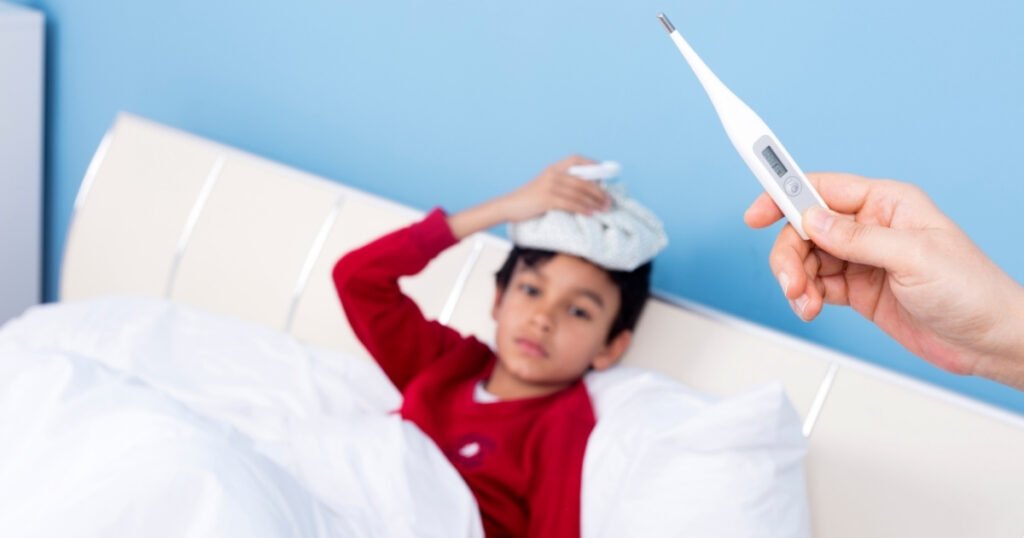Fever Fighters
Fever Fighters – Hey there! As a parent myself I understand how concerning it can be when your child has a fever. Although high temperatures can be worrisome, they often indicate that the body is fighting off an infection, so fevers aren’t always a reason to panic.
Let’s explore the topic of fevers together and give you the tools to confidently handle them.
Understanding Fevers: What’s Happening Inside?
A fever occurs when your child’s body temperature goes above the range typically, (Over 99.5°F) for kids. It’s important to note that temperature levels can vary among children and throughout the day.
Causes of Fevers in Kids
The primary culprits for fevers in children are usually infections like colds, flu, ear infections and stomach bugs. However bacterial infections and other common illnesses can also lead to a fever.
When a Fever Raises Concerns
In general, having a fever by itself isn’t usually a cause, for concern. It’s important to take care of your child’s health. If they seem unwell tired, not eating or drinking or if the fever is high (Over 104°F) it’s best to seek medical help promptly.
Managing a Fever: A Step-by-Step Guide (Fever Fighters)
Stay Calm and Collected: Firstly, I know a fever can be worrying. Try to stay relaxed. Remember, a fever often indicates that your child’s immune system is doing its job!
Check the Temperature: Use a thermometer (digital thermometers are accurate). If your child is than three months always consult with a doctor for any fever concerns.
Comfort Matters: Importantly ensure your child feels comfortable. Dress them in clothes. Encourage them to rest well.
Keep Hydrated: This is crucial! Offer fluids such as water, clear soups or electrolyte solutions (ORS) if necessary.
Consider Medication: If your child is uncomfortable or has a fever you can give them a fever reducing medicine, like paracetamol or ibuprofen. Always make sure to follow the recommended dosage based on your child’s age and weight. If you’re unsure its best to consult a doctor.
When should you seek assistance? Reach out to your doctor if:
Your infant is, under 3 months old. Has a fever. The fever persists for than 3 days. Your child seems sick is lethargic or refuses fluids. The fever is accompanied by symptoms like a rash, breathing difficulties or a stiff neck. If you have any concerns about your child’s health.
A Personal Story: When Fevers Can Mislead
I recall a time when a young boy came in with a fever at the clinic. His parents were understandably worried as the fever lingered for days. After running tests, we discovered that it was not caused by an infection but a reaction to a new medication! This goes to show that fevers can sometimes be deceiving, emphasizing the importance of seeking advice.
Tips for Managing Fevers in an Indian Setting (Fever Fighters)
Here are some suggestions specifically tailored for dealing with fevers, in India:
Cooling Baths: Giving your child a lukewarm sponge bath can help reduce their fever. Avoid using water for your child as it can make them shiver, which might increase their body temperature.
Natural Remedies: Some traditional home treatments, like basil (Tulsi) water, ginger tea or a mix of honey and lemon can provide comfort. Should not replace professional medical advice.
Be cautious of Misconceptions: In regions of India there are misconceptions about fevers such as avoiding fans or baths. These beliefs lack backing. Could potentially worsen a child’s health condition.
Frequently Answered Questions (FAQ’s)
1. Are fevers contagious?
Fevers themselves are not contagious but the underlying illnesses that cause them (such as colds or flu) often are.
2. When should I consider taking my child to the emergency room for a fever?
If your child is than 3 months experiences a high fever (above 40°C or 104°F) appears extremely unwell or has breathing difficulties seek immediate medical attention.
3. Can teething lead to a fever?
While some babies may have a rise, in temperature during teething it should not reach fever levels. If you have concerns, it’s best to consult with your healthcare provider.
4. Can vaccinations trigger a fever?
Certain vaccines may lead to an increase, in body temperature as a side effect. This is typically considered a reaction indicating that the vaccine is effectively doing its job.
Supporting Parents, Safeguarding Children (Fever Fighters)
With this knowledge, in hand you can approach your childs fever situation with assurance. Remember to rely on your intuition. If you sense something is amiss don’t hesitate to contact your childs doctor. We’re here to assist you in ensuring the well being and joy of your ones!
Book an appointment: Best Hospital in White Field
Mobile: 8095 37 0000
Telephone: 080 2503 4444, 080 2503 4455
Email: info@svasthahospital.com
Remember, you’re not alone on this journey. At Svastha, we’re all about helping you.. Let’s walk this path together, one step at a time. Best pediatrician in whitefield .

